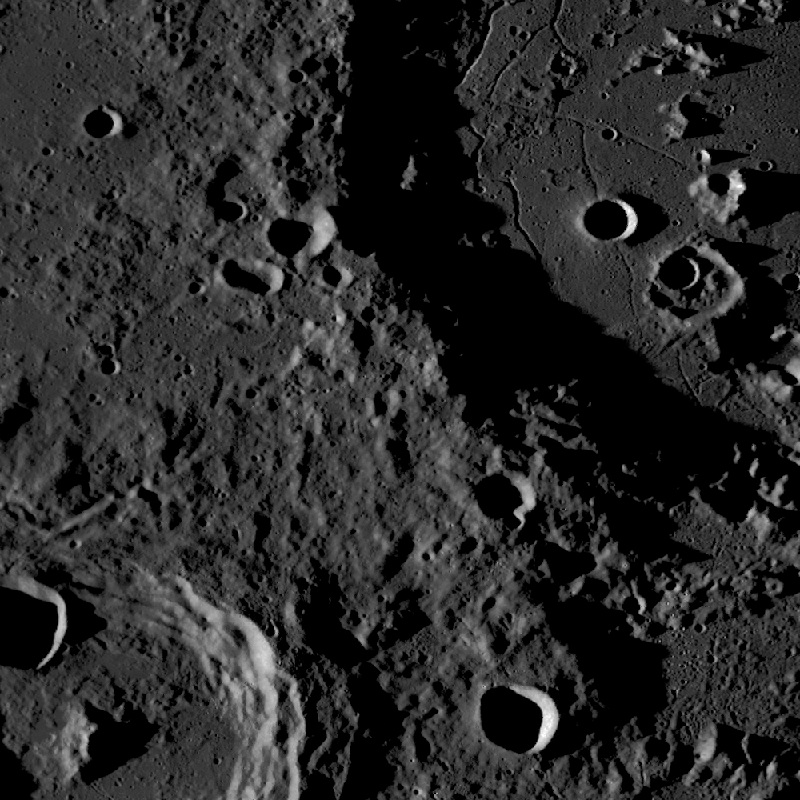Difference between revisions of "July 15, 2009"
| (2 intermediate revisions by the same user not shown) | |||
| Line 6: | Line 6: | ||
<em>LROC image from [http://lroc.sese.asu.edu/news/?archives/74-Mapping-the-Moon-with-the-Wide-Angle-Camera.html LROC News] [NASA/GSFC/Arizona State University]</em><br /> | <em>LROC image from [http://lroc.sese.asu.edu/news/?archives/74-Mapping-the-Moon-with-the-Wide-Angle-Camera.html LROC News] [NASA/GSFC/Arizona State University]</em><br /> | ||
<br /> | <br /> | ||
| − | This is the kind of new spacecraft image I long to see. It is from the Lunar Reconnaissance Orbiter, but acquired with the wide angle camera rather than the narrow angle one. So the region shown is 160 km wide, rather than 8 km, and the resolution is only 155 m/pixel instead of an astonishing 50 cm. But this view, perhaps useless for finding a safe landing spot, is perfect for finding a spot you might want to land at. This is the kind of image that can be used to discover interesting geologic relations to be investigated with other sensors or someday on the ground. The larger crater is Gauss, near the northeast limb. This LROC image reveals details of the crater floor rilles that are incompletely seen on Lunar Orbiter images. The dramatic lighting shows textures of the crater floors (that is a quadrant of Hahn at bottom left) and the hily terrains in between. But the low Sun and shadows hides the dark material that [ | + | This is the kind of new spacecraft image I long to see. It is from the Lunar Reconnaissance Orbiter, but acquired with the wide angle camera rather than the narrow angle one. So the region shown is 160 km wide, rather than 8 km, and the resolution is only 155 m/pixel instead of an astonishing 50 cm. But this view, perhaps useless for finding a safe landing spot, is perfect for finding a spot you might want to land at. This is the kind of image that can be used to discover interesting geologic relations to be investigated with other sensors or someday on the ground. The larger crater is Gauss, near the northeast limb. This LROC image reveals details of the crater floor rilles that are incompletely seen on Lunar Orbiter images. The dramatic lighting shows textures of the crater floors (that is a quadrant of Hahn at bottom left) and the hily terrains in between. But the low Sun and shadows hides the dark material that [[December_27,_2006|splashes]] across Hahn and the dark halo craters on the [[February_16,_2006|floor]] of Gauss. But these will be revealed on later LROC images, including some taken through other filters to provide color images and more importantly, compositional information. The show is just starting with LRO!<br /> |
<br /> | <br /> | ||
<em>[mailto:tychocrater@yahoo.com Chuck Wood]</em><br /> | <em>[mailto:tychocrater@yahoo.com Chuck Wood]</em><br /> | ||
| Line 15: | Line 15: | ||
<br /> | <br /> | ||
<strong>Related Links</strong><br /> | <strong>Related Links</strong><br /> | ||
| − | Rükl plate [ | + | Rükl plate [https://the-moon.us/wiki/Rükl_16 16]<br /> |
<br /> | <br /> | ||
<p><b>Yesterday's LPOD:</b> [[July 14, 2009|Soft Ball]] </p> | <p><b>Yesterday's LPOD:</b> [[July 14, 2009|Soft Ball]] </p> | ||
Latest revision as of 20:44, 18 August 2018
A Hahnsome View

LROC image from LROC News [NASA/GSFC/Arizona State University]
This is the kind of new spacecraft image I long to see. It is from the Lunar Reconnaissance Orbiter, but acquired with the wide angle camera rather than the narrow angle one. So the region shown is 160 km wide, rather than 8 km, and the resolution is only 155 m/pixel instead of an astonishing 50 cm. But this view, perhaps useless for finding a safe landing spot, is perfect for finding a spot you might want to land at. This is the kind of image that can be used to discover interesting geologic relations to be investigated with other sensors or someday on the ground. The larger crater is Gauss, near the northeast limb. This LROC image reveals details of the crater floor rilles that are incompletely seen on Lunar Orbiter images. The dramatic lighting shows textures of the crater floors (that is a quadrant of Hahn at bottom left) and the hily terrains in between. But the low Sun and shadows hides the dark material that splashes across Hahn and the dark halo craters on the floor of Gauss. But these will be revealed on later LROC images, including some taken through other filters to provide color images and more importantly, compositional information. The show is just starting with LRO!
Chuck Wood
Note - I need a great image of the Apollo 11 area for the July 20 LPOD...
Technical Details
July 8, 2009. Through the 560 nm filter.
Related Links
Rükl plate 16
Yesterday's LPOD: Soft Ball
Tomorrow's LPOD: Lunar Ballet
COMMENTS?
Register, Log in, and join in the comments.



